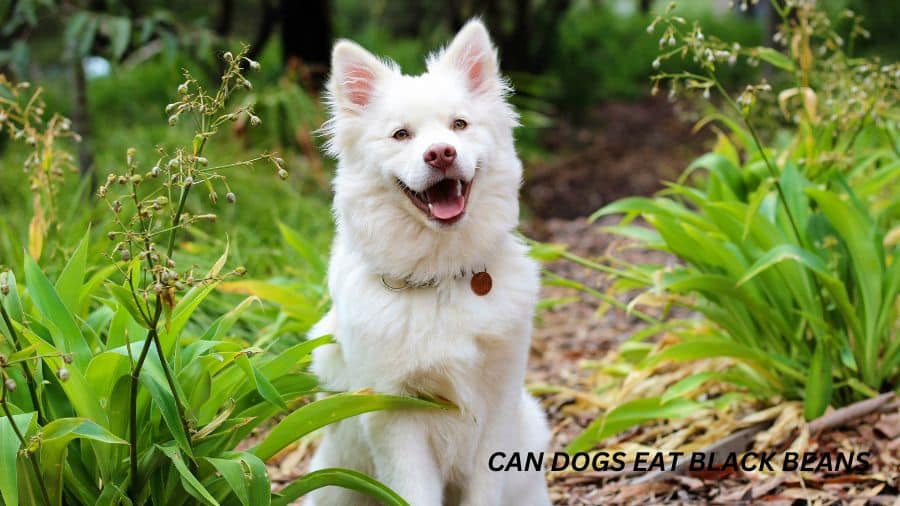
Considerations for boiled beans and black bean tea: Black beans are essential for budget-friendly recipes.
In Asia, enjoying the New Year means eating black beans, sometimes grape beans or black soybeans.
It might not be easy to find in stores throughout the year, but by the end of the year, it will be. This makes me question whether dogs and cats are safe to eat; perhaps you’ve considered it.
This article outlines the safety precautions and warnings for eating black beans.
Animals can eat black beans without getting sick?

Dogs can eat black beans that have been heated up without any seasonings added.
Black beans that have been cooked should be broken up or mashed before being given. If not treated, it may cause you to choke or experience stomach pain.
Black beans raw.
The proteolytic enzyme trypsin is inhibited by a high concentration of trypsin inhibitors found in raw black beans.
Raw beans might result in symptoms like diarrhoea and indigestion; however, since this item is heat-sensitive, cook the beans until they are tender.
As previously said, even when heated, it is advised to smash or chop it into bite-sized pieces to prevent choking.
Black beans can be transformed into kinako by grinding and frying them. You may easily incorporate it by adding a small amount to yoghurt or dry foods.
Is black bean tea acceptable?
Black bean tea is caffeine-free, making it suitable for dogs and cats. However, caution is essential, as specific tea blends may contain other tea leaves. As a result, it is best to thoroughly inspect the contents before letting pets to consume them.
If you can drink water and stay hydrated, there is no need to put too much effort. However, it is worth considering if you are unable to consume water.
Companion of black beans
Black beans belong to the soybean family. Below are a few articles that are relevant to the topic:
Benefits of consuming black beans:
Black beans are a rich source of protein. According to the Eighth Revised Food Composition Table 2022, 100 g of boiled black soybeans contain approximately 13.8 g of protein. Protein is an essential amino acid that the body cannot produce. In addition to providing energy, protein also plays a crucial role in preventing conditions like arteriosclerosis and high blood pressure.
Vitamin B and vitamin E facilitate nutrient absorption.
Black beans are a good source of vitamins B and E, which aid in absorbing protein and calcium.
Additionally, black beans include protein and calcium, which prevent nutrient wastage by enhancing absorption through the action of vitamins. Vitamin B and vitamin E facilitate nutrient absorption.
Nutrition of black beans
100g of boiling domestic black soybeans, suitable for consumption.
| nutrient | content |
| energy | 155kcal |
| protein | 13.8g |
| lipid | 8.5g |
| carbohydrate | 1.6g |
| vitamin E | 1.8mg |
| potassium | 480mg |
| calcium | 160mg |
| magnesium | 64mg |
| phosphorus | 220mg |
Considerations for giving to dogs
Exercise prudence to prevent an overabundance of generosity.
It can be affirmed that consuming it after heating is secure; nevertheless, it is recommended that moderation is exercised.
Moreover, it has lectins and saponins, which have the potential to cause diarrhoea and digestive problems. Hence, it is crucial to show prudence and refrain from excessive utilisation.
Exercise caution when dealing with soy sensitivities.
Black beans belong to the soybean family. Therefore, it is advisable to avoid feeding them to dogs and cats with soy allergies.
When offering soybeans for the first time, you should feed them in tiny portions, as you may be unaware of any potential soybean allergies.
Following a meal, diligently monitor for any atypical behaviour and promptly seek consultation from your veterinary clinic if you experience any symptoms.
Take note of osechi and rice crackers, which are prepared for individuals.
Dogs and cats can absorb excessive amounts of sugar and salt from black beans found in human cuisine and processed items.
Although it may seem insignificant, patience is essential when considering the future well-being of your dog and cat.
Summary
Dogs can safely consume black beans. It is important to avoid feeding mature or uncooked black beans, such as osechi black beans, to dogs and cats, as they can adversely affect their bodies.
Black bean tea contains caffeine, making it suitable for consumption by dogs and cats. However, it is not necessary to actively provide it to them if they lick the water.
Black beans belong to the soybean family. Therefore, dogs and cats with soybean allergies should exercise extra caution.
FREQUENTLY ASK QUESTION
Can Dogs Eat Black Beans?
Dogs can eat black beans because they are high in fibre, iron, calcium, and potassium. The legume is a fantastic supporter of the blood and circulatory systems, aiding in disease prevention and maintaining the animal’s body’s normal functioning.
Serve it properly cooked, seasoned-free, and as an accompaniment to your dog’s meals, taking care not to serve it in excess.
Can dogs eat white beans?
White beans are an excellent source of magnesium, an essential mineral for heart health. It is also great for the dog’s digestive system, fighting constipation and the excessive absorption of carbohydrates by the body.
A good indication is to offer white beans to your animal along with other legumes (such as chayote and carrots), always as a snack and not as a main meal.
Can dogs eat pinto beans?
Pinto legumes are also high in fibre and contain high levels of calcium and phosphorus, making them an ally in maintaining bone health.
Their nutritional values are strikingly similar to those of black beans, which is why it is crucial to prepare them thoroughly and serve them in small quantities to prevent the benefits from being reversed for your dog.
When weighed, carioca legumes are naturally healthier, so if you are uncertain which is superior, opt for carioca.
Can a dog eat Black-eyed peas?
Black-eyed peas are a healthy and delicious snack for your dog. They contain fewer carbohydrates and fats, allowing them to be consumed in a larger quantity without causing overeating.
They effectively combat high cholesterol, blood pressure instability, and diabetes, making them a valuable addition to canine weight loss diets.
It is advisable to consult a veterinarian beforehand to determine the appropriate amount for your pet’s specific consumption.
Leave a Reply